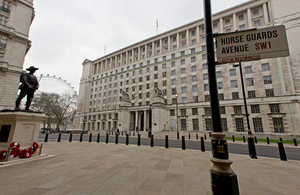UKEF provides £100 million to help Blyth renewable specialists open new factory and secure exports
- JDR Cables announced intentions to build state-of-the-art submarine cable facility in September 2021
- UK Export Finance has backed a £100 million working capital loan to fund the construction, supporting 170 high quality local jobs in the North-East
- The new site will enhance JDR’s operations and unlock international offshore wind contracts as it supports global net-zero goals
JDR Cable Systems (JDR), a global subsea cable supplier and servicer and part of the TFK Group, has received a £100 million working capital loan from Société Générale, HSBC UK and Bank Gospodarstwa Krajowego (BGK), backed by UK Export Finance (UKEF) to start building its new state-of-the-art subsea cable manufacturing facility in Cambois, near Blyth, Northumberland to secure more national and international contracts.
JDR Cable Systems is the leading provider of subsea cable technology and offshore services that connects the global offshore energy industry. Global energy companies depend on high-performing and resilient cables to provide clean power created by offshore wind farms to land. Offshore wind farms play a vital role in helping countries reach net-zero commitments and, with 2,571 offshore wind farms and projects in over 50 countries, JDR’s exporting potential is significant. It follows the company receiving funding from the government’s £160 million Offshore Wind Manufacturing Investment Support scheme announced in September 2021.
Secretary of State for International Trade, Anne-Marie Trevelyan said:
It has never been more important to strengthen energy security in the UK and around the world as we reduce our reliance on fossil fuels and face instability in global energy markets. Our support for UK companies who are enabling the transition, such as JDR, is vital in securing a cleaner and more secure future. This will grow our economy by creating jobs and unlocking vital trading opportunities.
The support from Société Générale, HSBC UK and BGK backed by UKEF, will enable JDR to build a facility to support the company’s production of submarine cables which are used to transport energy from offshore renewables. It is the first step in JDR’s long-term plan to expand into better supporting the global renewable energy market and help the UK and other countries across the globe to meet ambitious net-zero goals. Planning approval has been granted to JDR and once planning conditions have been met, the construction of the new facility will begin in the autumn of this year, with the facility set to open in 2024.
UKEF provided support to JDR Cables with an Export Development Guarantee (EDG) which helps UK exporters to access to high-value loan facilities for general working capital to execute projects that will boost international trade. Since launching in 2019, the government has backed over £10 billion in loans across multiple industries through the EDG.
Following this announcement, the Department for International Trade will host the Green Trade & Investment Expo this autumn in the North East. The Expo will showcase how UK companies like JDR Cables can support the UK’s clean growth ambitions and the drive to net zero.
We are committed to helping the UK and other countries around the world make vital progress on the green transition. Thanks to UKEF’s support, we are looking forward to opening the doors of our state-of-the-art facility in Blyth in 2024 and play an even bigger role in supporting the offshore wind sector across the globe with high quality, specialist subsea cables.
Vijay Raman, UK Head of Development & Structured Export Finance, and Su Ming Lim, UK Co-Head of Advisory & Financing Group at Societe Generale, add:
We are delighted to have advised JDR for the first stage of this new facility, which marks a significant milestone for the company’s plans to support the growing offshore wind sector, whilst also creating jobs for local communities.
As the power generation capacity and demand for offshore wind projects gets bigger and bigger, so must the supporting infrastructure such as the power transmission capacity of cables like those manufactured by JDR. This infrastructure is critical to the success of renewable energy projects, as well as for the success of the UK’s net zero strategy and the world’s energy transition agenda.
JDR plays an important part enabling renewable energy generation and energy security. This new UK cable facility supports our customer’s UK and international growth ambitions and helps further establish the UK’s manufacturing capability. At HSBC UK we see our role supporting British businesses in the transition to net zero by providing world-class finance solutions and expert advice. We’re proud to have provided funding to JDR, working closely with UK Export Finance, and acting as sustainability coordinator for the financing.
